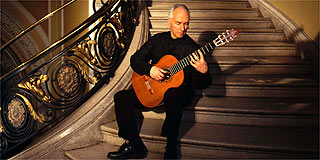| B i o g r a p h y |
 John Christopher Williams
(born 24 April 1941) is a Grammy Award winning Australian classical
guitarist. Born in Melbourne, Australia to an English father (Len
Williams,
founder of The Monkey Sanctuary in Cornwall, England) and an
Australian-Chinese mother (a daughter of well known Melbourne barrister
William Ah Ket), Williams was taught initially by his father. At
the age of twelve he went to Italy to study under Andrés Segovia.
Segovia said of Williams that "God had touched his brow". Later, he
attended the Royal College of Music in London, studying piano because
the school did not have a guitar department at the time. Upon
graduation, he was offered the opportunity to create such a department.
Being such a lover of the instrument, he seized the opportunity and ran
it for the first two years. Williams has maintained links with the
College (and with the Royal Northern College of Music in Manchester)
ever since. Williams is best known as a classical guitarist, but
has explored many different musical traditions. He has collaborated
with Julian Bream and Paco Peña and was a member of the fusion group Sky. He is also a composer and arranger.
John Christopher Williams
(born 24 April 1941) is a Grammy Award winning Australian classical
guitarist. Born in Melbourne, Australia to an English father (Len
Williams,
founder of The Monkey Sanctuary in Cornwall, England) and an
Australian-Chinese mother (a daughter of well known Melbourne barrister
William Ah Ket), Williams was taught initially by his father. At
the age of twelve he went to Italy to study under Andrés Segovia.
Segovia said of Williams that "God had touched his brow". Later, he
attended the Royal College of Music in London, studying piano because
the school did not have a guitar department at the time. Upon
graduation, he was offered the opportunity to create such a department.
Being such a lover of the instrument, he seized the opportunity and ran
it for the first two years. Williams has maintained links with the
College (and with the Royal Northern College of Music in Manchester)
ever since. Williams is best known as a classical guitarist, but
has explored many different musical traditions. He has collaborated
with Julian Bream and Paco Peña and was a member of the fusion group Sky. He is also a composer and arranger.
Williams has commissioned guitar concertos from composers such as Stephen Dodgson, André Previn, Patrick Gowers, Richard Harvey and Steve Gray. He has also worked with composers from his native Australia, including Phillip Houghton, Peter Sculthorpe, Ross Edwards and Nigel Westlake, to produce guitar works that capture the spirit of his homeland. He enjoyed a worldwide hit single with his recording of Cavatina by Stanley Myers, used as the theme tune to the Oscar-winning film The Deer Hunter (1979). The piece had originally been written for piano but at Williams' invitation, it was re-written for guitar and was expanded by Myers. After this transformation, it was used for another film, The Walking Stick (1970). In 1973, Cleo Laine wrote lyrics and recorded the song "He Was Beautiful" accompanied by John Williams. A year later, it was a top 5 UK hit single for Iris Williams (no relation). At the invitation of producer Martin Lewis he created a highly acclaimed classical-rock fusion duet with celebrated rock guitarist Pete Townshend of The Who for Townshend's anthemic Won't Get Fooled Again for the 1979 Amnesty International benefit show The Secret Policeman's Ball. The duet was featured on the resulting album and the film version of the show - bringing Williams to the broader attention of the rock audience.
The relationship with Lewis led to Williams' classical-rock fusion band Sky being invited to give the first-ever rock concert to be held at Westminster Abbey — a benefit concert for Amnesty International that Lewis produced in February 1981. Willams has explained that he uses amplification for concerts in large halls. Williams and his third wife Kathy reside in London and Australia. He has a daughter Kate, now an established jazz pianist, from his first marriage (to Lindy); and a son, Charlie Williams, from his second marriage (to broadcaster Sue Cook). John Williams was instrumental in bringing the works of Agustín Barrios back to popularity. Williams has often spoke well of Barrios' work, even stating the he believes Barrios is the greatest composer of guitar music.
John Williams has expressed his frustration and concern with guitar education and teaching, if it is too one-sided, e.g. focusing only on solo playing, instead of giving guitar students a better education including ensemble playing, sight-reading and a focus on phrasing and tone production/variation. Williams notes that "students [are] preoccupied with fingerings and not notes, much less sounds"; some are able "to play difficult solo works from memory", but "have a very poor sense of ensemble [playing] or timing". He notes that students play works from the solo repertoire that is often still too difficult, so that the teachers often put more "emphasis on getting through the notes rather than playing the real substance of each note". To encourage phrasing, tone production and all-round musicianship, Williams arranges for students to play together in ensembles, choosing works from the existing classical-music repertoire, such as the "easier Haydn String Quartets".